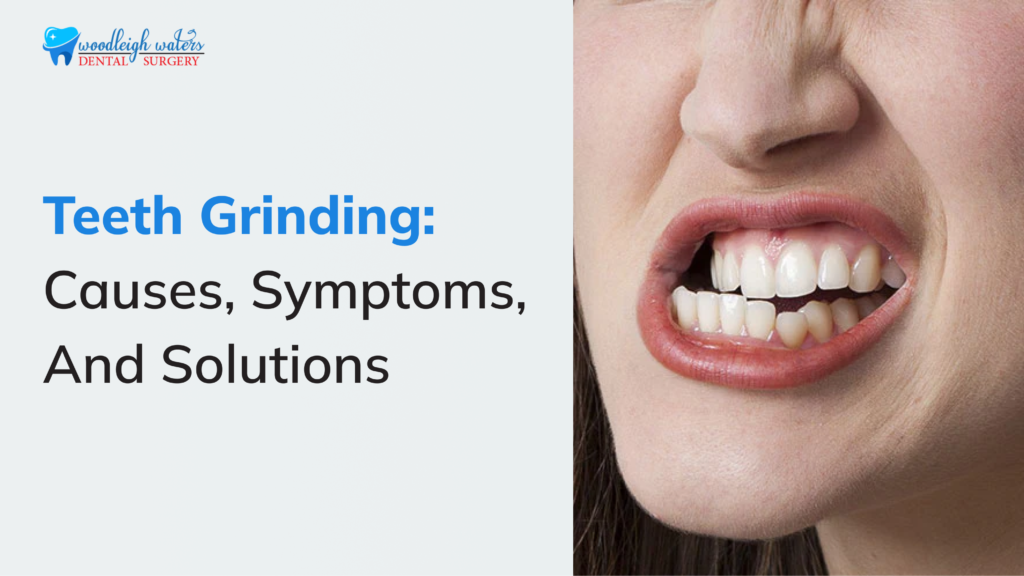
Teeth grinding, often known as bruxism, is clenching or grinding your teeth. Bruxism has become the most common yet unnoticeable dental issue nowadays.
The reason behind it is teeth grinding contains minor symptoms that are hard to notice easily. However, people start noticing it once the symptoms start getting apparent.
Bruxism can occur due to numerous factors, out of which stress and hyperactivity are the most common causes. The teeth-grinding problem is not specific to any age. It can occur in any age group, from children to adults, but once started, it becomes challenging for patients to get rid of it.
However, teeth grinding can be treated easily if treated properly on time. For this, you need to get proper knowledge about the main causes and symptoms of teeth grinding.
That’s why we have brought this blog today, which will guide you through the common causes, symptoms, and treatment of teeth grinding.
Causes of Teeth Grinding
As discussed earlier, stress and hyperactivity are the most common causes of teeth grinding, but the list does not end with these causes. Several other factors contribute to the occurrence of teeth-grinding problems. Let’s see the most common causes of teeth grinding.
Stress and Anxiety
All people have different ways of showing their stress, out of which teeth grinding becomes the most common. People grind their teeth in response to their stress, which slowly becomes a habit. However, stress soes are not lower when grinding teeth.
Sleep Disorders
Many people face the issue of sleep disorders like obstructive sleep apnea, which either stops or reduces your breathing while sleeping. To overcome this situation, people start grinding their teeth. In most severe cases of sleep disorders, the frequency of teeth grinding is higher.
Lifestyle Factors
In today’s fast-paced world, most people have unhealthy lifestyles, which have become the primary cause of bruxism. You might wonder how. The regular consumption of alcohol, caffeine, or cigars disturbs your sleep, ultimately leading to teeth-grinding issues.
Misaligned Teeth
The structure of your teeth also contributes to the occurrence of teeth grinding. It might seem unbelievable, but it is true. The improper alignment of teeth causes additional strain on the jaw muscles, which eventually leads to grinding problems.
Hereditary Factor
Just as diabetes is hereditary, bruxism can also be hereditary. If any of your family members has or has a teeth-grinding problem, it is obvious that other family members, including you, would also face the same problem.
Symptoms of Teeth Grinding
Let’s have a look at the symptoms of teeth grinding.
Pain in Jaw
Teeth grinding mainly occurs during sleep, due to which you get to experience pain in the jaw bone when you wake up. And pain or discomfort in the jaw is one of the most common symptoms of teeth grinding. Regular teeth grinding can lead to stiffness and soreness of the jaw.
Flattened Teeth
Your teeth would start getting worn out or flattened because of teeth grinding for a prolonged time. Untreated chipped or flattened teeth can lead to tooth loss or other severe conditions.
Pain in Ears
Teeth grinding causes strain on the jawline, which can result in some pain in your ears. However, continuous ear pain is often neglected by people, thinking it might be because of some other reason. However, bruxism can also be one reason for your earache.
Improper Sleep Schedules
Sleep disorder is one of the major causes of teeth grinding, and that’s why people having teeth grinding issues might experience disrupted sleep schedules, eventually leading to fatigue and drowsiness.
Key Solutions for Teeth Grinding
Let’s have a look at what measures you can follow for teeth-grinding treatment.
Stress Management
As stress is the ultimate cause of teeth grinding, you should opt for stress management techniques like yoga, meditation, or deep breathing. These techniques will help you control your stress, ultimately helping you lower the frequency of teeth grinding.
Using Mouthguards
Teeth grinding problems mostly occur during the night while sleeping. In such situations, mouthguards prove to be of ultimate help. These devices prevent direct contact between upper and lower teeth by providing a cushioning effect to them. This would ultimately close all possibilities for bruxism to occur.
Dental Treatments
As misaligned teeth can result in bruxism, properly aligning them can remove the possibility of the occurrence of bruxism. To align your teeth perfectly in Berwick, you should consult an experienced Berwick dentist like Woodleigh Waters Dental Surgery.
Improving Your Lifestyle
To treat your teeth-grinding issue, you should limit the consumption of alcohol and caffeine during nighttime. This would ultimately help you to have proper nighttime sleep schedules, thus reducing the chances of teeth-grinding problems.
Final Thoughts
Teeth grinding is one of the most neglected dental problems. The reason behind this is that people suffering from this issue are often unaware of it because of its occurrence at night. And that’s why teeth grinding becomes a lifetime dental issue.
However, by noticing its common symptoms, you can easily figure out teeth grinding issues and choose the suitable treatment in Berwick by consulting a proper Berwick dental centre.
Stress, sleep disorders, lifestyle problems, misaligned teeth, and hereditary factors are the most common causes of teeth grinding. Meanwhile, jaw pain, flattened teeth, earaches, and irregular sleep schedules are the major symptoms you would notice due to bruxism.
To get rid of teeth-grinding issues, you can opt for treatments like stress management, using mouthguards, controlling caffeine and alcohol consumption, and aligning your teeth properly.
Woodleigh Water Dental Surgery is a popular Berwick dental studio. We are well-known for our wide range of dental treatments and the quality of care provided.
Contact us now to get the best treatment for teeth grinding in Berwick.
